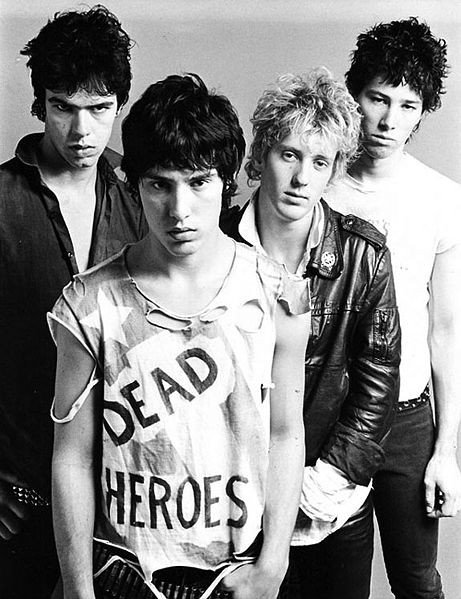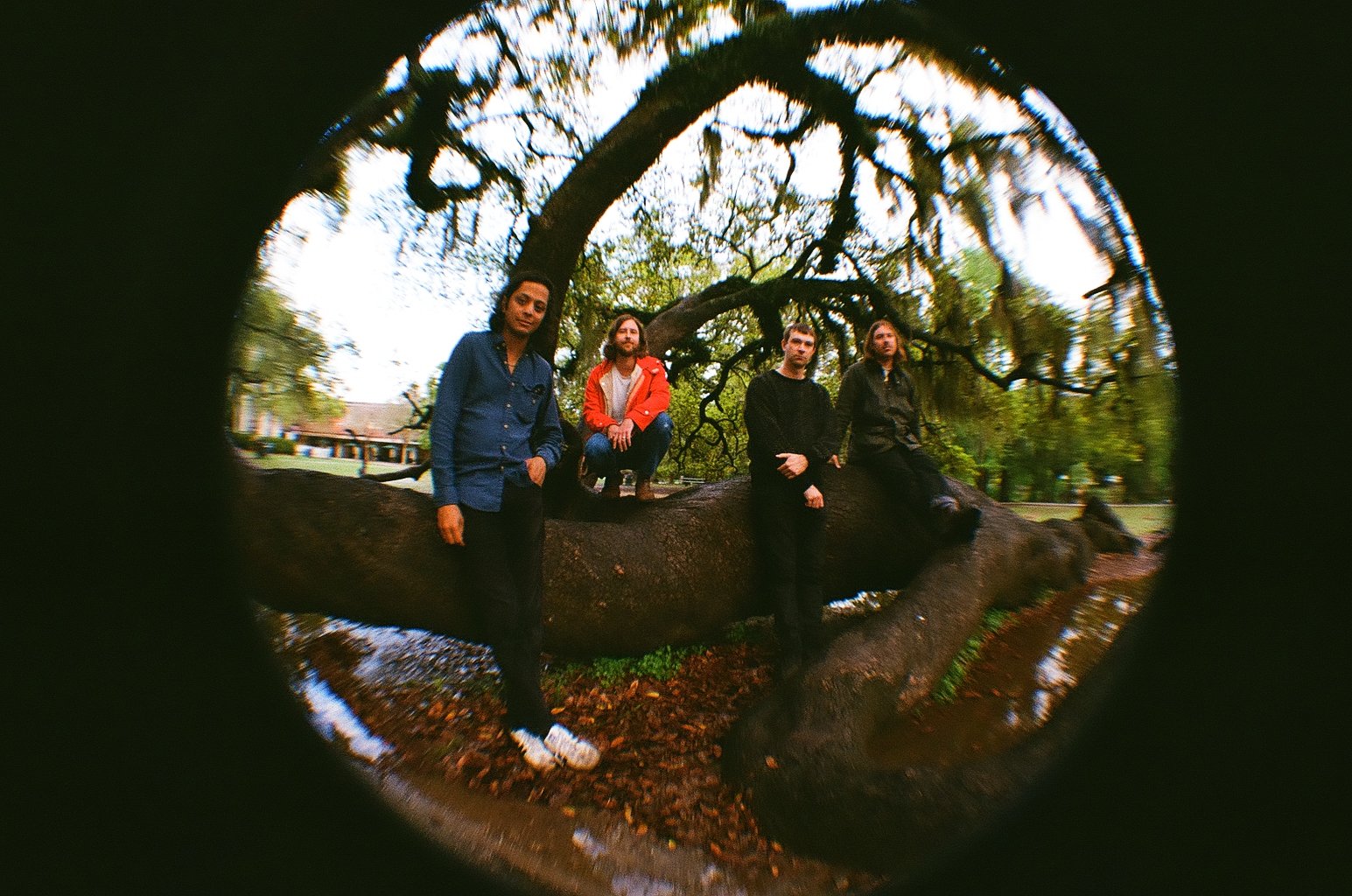Rock 'n' Roll Greats Give Silver Synthetic More Than Inspiration

The New Orleans-based rock band finds musicians to be part of their language.
“It’s a shorthand,” guitarist Kunal Prakash of Silver Synthetic says.
The New Orleans-based rock band released its self-titled debut album Friday on Third Man Records, and the band’s bio presents Silver Synthetic as the product of their record collections as it casually drops the names of heroes of the vinyl ‘70s—The Velvet Underground, T. Rex, Big Star, and The Kinks among others. Prakash confirms that the members are collectors and that their records show up in the music, but as a way of communicating what they hear in their heads.
While recording the song “Unchain Your Heart” from the new album, Prakash told drummer Lucas Bogner, “Play the Ringo fill,” and Bogner knew exactly what he meant. They could have spent an hour trying to figure out a drum fill that approximated the feel that Ringo Starr achieved on “Get Back,” or they could go straight for it and trust that Bogner’s musicianship and the details of the song would force changes that would keep the part from sounding like a lift. Prakash approached his own playing in similar ways. “Chasm Killer” has two solos, and he had specific models in mind for each.
“I wanted one to be Slash’s solo in the ‘November Rain’ video when he’s outside of the church in the desert,” Prakash says. “I wanted the second to sound like that, but Neil Young and Crazy Horse, slamming on the guitar.”
Conversations like that take place daily in basements and rehearsal halls across the country, just as they always have. Rock bands start because the members are fans first and want to be a part of the excitement they get from the records they love. Silver Synthetic’s story has some specifically modern twists though—some tied to the pandemic, but some tied to a time when rock doesn’t occupy the place it once did in the musical culture.
Silver Synthetic started in 2017 when Chris Lyons of garage punk band Bottomfeeders had some songs to figure out. They didn’t make sense for Bottomfeeders, so he reached out to Prakash to see if he could help him with what Lyons referred to as a batch of “pop songs.”
“I wanted to know what his definition of ‘pop song’ was,” Prakash says, so they met. What he heard was certainly catchy, but he heard them as rock ’n’ roll songs, and soon the two started fiddling with them. Lyons had already sketched out a lot of a song titled “The Door”—Prakash describes it as “Big Star-meets-The Kinks”—but it was enough of an introduction to Lyons’ songs that Prakash wanted to keep at it.
He moved to New Orleans in 2018, and everybody in the band moved to New Orleans some time after Hurricane Katrina. Lucas Bogner and bassist Peter Campanelli moved here to attend Loyola University’s Music Studies program. Prakash was on hiatus from the Nashville-based rock band JEFF the Brotherhood, and he was open to new musical adventures. Part of the fun of being a musician for him was finding his way into different musical contexts, whether its in Jake and Jamin Orrall’s JEFF the Brotherhood, Quintron’s Weather Warlock, or American Death Ray in New Orleans.
His work with Lyons existed in a pleasantly nebulous space as Prakash took on more of a role in shaping the material. On “Out of the Darkness,” the title track from their debut EP released last year, he was instrumental in sorting out the guitar parts that open the song. “When we were doing it live, it was a crazy Krautrock jam, and then we’d look at each other and go into the song,” Prakash says. “We had to figure out who’s doing what and how they’re going to blend. We had to figure out how to make it tell a story and not just be a boring jam in E.”
You can certainly hear the insistent, motorik beat that made him think of Can and Neu, but Lyons’ jangling guitar so clearly foreshadows what the song will become that even though the intro goes for 1:45, it never feels like a jam, nor will you remember that the intro is more than a third of the song once the power pop verse and chorus shape kick in.
Since Lyons already had a band in Bottomfeeders with Bogner, it wasn’t immediately obvious if this was a side project or a new band or something other. He felt like the songs were different enough from those he wrote for Bottomfeeders that a different name and lineup made sense to him, but it wasn’t obvious what they were forming. According to Prakash, “The process made the group feel like a band.” Lyons brought songs to him and they sorted out the guitars, then they took the songs to Bogner and Campanelli to further shape them and make them a more collective product. “Lucas is good at structural stuff, and he brings in all the vocal harmonies.”
Trying to nail down the specific nature of Silver Synthetic might seem like fussy, but there was a time when a band was central to a musician’s identity—particularly in rock. But bands became a little more theoretical when the gigs that gave them a reason to exist aren’t there anymore. Bottomfeeders lost their second guitarist when he moved out of town, not because he didn’t care about the music or band but because he was out of work during the pandemic. How do you find the sense of self that comes with a band when that band never plays?
When pressed on the question, Prakash leaves himself an out. “ It feels like it’s the main thing at the moment,” he says, perhaps reflecting the reality of the indie rock musician’s life in the 2020s when it’s unlikely that a rock band will become so big that it’s worth putting the group identity ahead of everything else. Projects become about the work, and Prakash has found the work satisfying. The process of collectively shaping the material is where the musical shorthand came in, which Prakash likens to an armful of “What Would Jesus Do?” wristbands: “What would Jimi Hendrix do? What would Ringo do? What would George do? What would Paul do? You put the wristbands on to solve little problems in the studio or while writing,” he says.
His list of wristband artists is heavier on Beatles than the album would suggest. Third Man Records’ PR for the record dubs the band “garage-psych,” and the garage is more manifest in attitude than sound. Everybody in the band has been through a punk rock/bash it out phase, but they felt that the songs merited a more musical vibe, one that lands in a very specific musical space. “ It’s tough rock ’n’ roll, but it’s pretty easy on the ears as well,” Prakash says. “You can put it on and sit on the couch and pet your cat and also feel like a badass.”
It’s a musical energy that doesn’t have the currency it did before punk rock, which changed the tempo, volume and intensity that listeners recognize as energy. Silver Synthetic opens with “In the Beginning,” with a rhythm guitar part that would have sounded right at home on The Velvet Underground’s Loaded, and Loaded has that vibe, as does The Slider, The Village Green Preservation Society, Radio City and a lot of mid-’70s albums that are now heard as less confrontational than they were in their time.
Prakash can identify a more accurate Lou Reed reference point than Loaded, though. Loaded is applicable, but “Chris was into Coney Island Baby,” he explains. “He’d pick me up in his car and was always listening to it. There was some kind of osmosis that went on for sure.” Conceptually, it makes sense as Reed played a complex game with listeners on his 1975 classic, setting the low-key menace of a downtown party (“Kicks”), a sexist boast (“A Gift”) and high school memories (“Coney Island Baby”) in smooth, urbane musical settings that colored each song in unexpected, vaguely (or overtly) thorny ways. Prakash realized that repeated exposure to the album affected him as well because lead guitarist Bob Kulick’s approach affected the way he thought about lead guitar on Silver Synthetic.
“It’s really, really slick lead guitar that fits in perfectly with every song. It’s never too busy.” That became his goal.
Recording has been part of Silver Synthetic’s story from the outset. When they played their first gig, they had a limited run of 10 cassettes available at the merch table—they all sold out—and in April 2019, they started recording songs for Silver Synthetic. They knew they wanted the album to be representative of them, which is why it is self-titled, and because of that, they kept the instrumentation close to what they did they live. They have two guitarists, so they wanted to largely limit the songs to two guitar parts. There are overdubbed guitars and the occasional organ and piano, but since the songs made the band, they wanted to honor those songs.
That fall, they booked a handful of out of town dates including one in Memphis and one in Nashville. Prakash set up the Nashville show since he had a lot friends there from JEFF the Brotherhood days, and he wanted a lineup that would bring people out on a Sunday night. He asked one band to play that included Ben Swank, co-owner of Third Man Records, and even though the band wasn’t available, Swank showed up. He bought a cassette that night, then called again a few weeks later to ask if they had any more music.
The show “was one of those moments that immediately caught everyone’s attention in the room when they started playing, where you realize there is something special going down,” Swank says. “I was floored by these incredible songs that felt familiar even though I’d never heard them before in that way that only great music does. There is a solid sense of history to these songs, but they are indebted to nobody and completely original."
Silver Synthetic signed with Third Man Records to release the album, and the label has the option for a second. Prakash hopes they get to that, but the band wasn’t sure at first. They recorded 10 songs with the idea of an economical, precise statement of who they are, and Third Man asked how they’d feel about pulling two songs off of it. The band was understandably resistant until they heard the album without “Any Way I Can” and “Making Time” and saw the label’s point. At approximately 32 minutes, it sounds effortless, and at 15 or so minutes a side, it easily fits contemporary side lengths on vinyl.
Silver Synthetic was slated for a May or June 2020 release, but since it took a while for the country to realize how long we would have to deal with COVID-19, that release date kept backing up a few months at a time. As badly as everybody wanted the album out, it was hard to release an album by a new act when it couldn’t tour. Rock music doesn’t get the attention that it once did, so touring is essential to give newspapers, alt-weeklies, bloggers, websites, and radio stations a reason to shine light upon an album and act. The album would be handicapped in its effort to find an audience if the band couldn’t play cities outside of Orleans Parish.
As a stop gap until the country opened up, Third Man released Out of the Darkness last October. The four-song EP included the title cut and “Unchain Your Heart” from the album and the two songs that were pulled. Finally, the band and the label couldn’t wait any longer and they released the album on April 9. “ If we waited any longer, we’d all go nuts,” Prakash says.
The time off was tricky for the band. They found their relationship by making music, but they didn’t want to go too far down the path of working on new music for fear that they would emotionally move on to the new songs just before they would have to go on the road and play the old ones nightly. Prakash tried to occupy himself with the non-creative, joyless tasks that never get to the top of the priorities list under normal circumstances. He got the band’s email list together, for example, so that they’d have it when they were ready to tour.
“It sucks, no two ways about it,” he says, laughing. But Prakash is guardedly optimistic about touring. People are talking to Silver Synthetic’s booking agent again, and venues are starting to book touring acts. New Orleans is slowly adding shows in September like the rest of the country, so the band hopes to be on the road this fall and into 2022. The new challenge is venue availability. “If you can get something on the books, go for it,” he says. “At least it has to be rescheduled. So much availability at clubs is gone either because clubs have closed or because they have stuff booked from 2020 that has been rescheduled and rescheduled and rescheduled. There’s a traffic jam in the booking world right now.”
“It’s a weird time to feel very committed to one [band] when one of the most elemental things we’re supposed to do, we can’t to—play shows,” Prakash says. He admits that he enjoys the challenge of being called to jump in and learn 20 songs to join a tour at the last minute, and the musical challenges involved in adapting like that motivate him, but he’s looking forward to Silver Synthetic getting a chance to show off these songs live. They’ll play a live-streamed in-store at Euclid Records—appropriately, considering their first gig was a record store show as well—on April 15 at 7 p.m., but that’s not the same as playing in a sweaty bar on a beery night where these songs’ grit comes into sharper focus.
Euclid Records is also a safe space where there’s a positive feedback loop between the store and the band. The bands that shaped Silver Synthetic have more currency in vinyl record stores than in the culture at large, where whatever’s new rules. Guitar-first rock bands are no longer the musical default setting they once were, Prakash admits. “There’s not really a hot shit young band of cute guys or girls,” he says. “That’s not a popular music model anymore.” The popular rock bands are legacy bands—Foo Fighters and …?—or they stretch the definition of “rock” like The 1975.
“ At times, you’re Damn, all this music I love making—is it completely irrelevant because people don’t give a shit about guitar music anymore?” Prakash says. “Then you play ‘Hey Hey My My’ in a roomful of drunk people during Mardi Gras and you think, Oh yeah, this is awesome. This still works. Rock ’n’ roll rules.”
Creator of My Spilt Milk and its spin-off Christmas music website and podcast, TwelveSongsOfChristmas.com.






